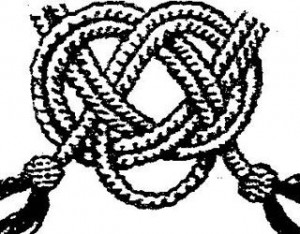
The alamar knot is a decorative knot, traditionally used to tie a mecate (a traditional Mexican vaquero rein) around a young horse’s neck. According to the Cowboy Showcase glossary, in old California horse training, the alamar knot was tied from two coils of mane hair and draped over the horse’s neck to denote that the horse had graduated to a finished bridle horse.
From the Calclassics website.
“A badge of honor, the alamar knot was tied in a mane hair mecate when the California stock horse had graduated to become a bridle horse. Two coils of the mecate were draped over the horse’s neck with the knot proudly worn on the horse’s chest. This set him apart as a finished bridle horse. It could also be slipped up toward the throat latch with the lead run through the bosalita to lead.
“Today, the alamar is preserved by a knowledgeable remnant on their horses and sometimes in their homes. The martingale or choker was created as an “excuse” to add silver to an outfit. As part of the growing interest in the vaquero, we are seeing a welcome resurgence of the alamar as an emblem of the renaissance of the horse culture of the Pacific Slope.”
 The alamar knot is easily tied, and requires rope that is both soft and holds its shape. Soft clothesline is perfect for learning how to tie an alamar knot.
The alamar knot is easily tied, and requires rope that is both soft and holds its shape. Soft clothesline is perfect for learning how to tie an alamar knot.
Divide the length of rope visually into thirds while holding it in front of you, as you would fold a t-shirt. Pinch the rope one-third in from both ends. Hold the rope in front of you, allowing the ends to fall and double the rope (a single-strand curve should be in the rope’s middle section). Adjust the rope so the ends extend a few inches past the curve.
Place the rope on a flat surface, maintaining the exact shape of the rope it had while you held it in front of you.
Make a loop with the doubled rope segment on the left side. The loop should be small and close to the curve that is between the two standing lines. To make the loop, pass the top of the left segment over itself.
Bring the doubled line on the right over the left line, behind the single strand curve, then over, and through the loop.
Adjust the rope, evening out the two top doubled lines and the ends.The ends should extend a couple of inches below the knot, so they can be made into tassels. The two doubled lines serve as loops to hang from a rope collar. The knot can now be adjusted according to the image found on the Ropeworks diagram . A finished alamar knot looks like a pretzel.
You can see some pictures of the process by clicking HERE
